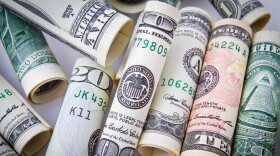Editor's Note: The Duke Immersive Virtual Environment is incorrectly named in the audio.
Researchers at Duke University are using a virtual reality center to test experiments that aren’t feasible in the real world.
It’s called the Duke Immersive Virtual Environment, or the DIVE, for short. In reality, it’s a cube. Six sides. You get inside. Images are projected on each wall. With the help of special goggles, the images become an immersive 3-D world. A special wand allows you to interact with the world.
It has applications for everything from psychiatry, to the mining industry, and even creative writing.
One of the simulations is of a kitchen. Whoever enters is asked to find a pair of keys. The sound in the room increases in intensity and volume as the simulation continues. A car starts beeping, a pot boils over and creepy violins play in the background.
Regis Kopper is the director of the DIVE and part of the Pratt School of Engineering. He says the kitchen simulation is a good example of how the DIVE can be used for psychological experimentation.
“This environment was used in an experiment exactly to examine how people would get stressed in a virtual environment. There are actually no keys here,” he says. “The idea is as you hear all this background noise… the idea was to see if people would start getting stressed by examining the skin conductance, the heart rate and all that.”
The great thing about the DIVE is programmability. No matter what your specialty, you can probably come up with a use for it. Kopper says researchers are working on adapting a mining simulation for the DIVE. Mining’s a pretty dangerous profession, and it’s safer to train in a virtual environment than the real one.
There are even applications for something like creative writing. David Zielinski, software engineer for the DIVE, says that MFA students at Duke use it to create virtual worlds.
"You can also be more imaginative and not be limited to creating structures that can even feasibly exist.” - David Zielinski
“That’s another example of the cross disciplinary work we’ve done,” he said. “You can create realistic training environments in here, but you can also be more imaginative and not be limited to creating structures that can even feasibly exist.”
There is another draw to the DIVE. It can help attract people to science. You can’t find these things everywhere. Kopper says there are only about 10 to 15 in the United States. Every Thursday, the DIVE holds an open house where anybody can come.
The DIVE has a variety of practical applications, but it’s also just plain fun. Most tours end with a ride on the virtual roller coaster. It’s thrilling, and, other than the lack of wind rushing past, almost as good as the real thing.
http://www.youtube.com/watch?v=71s0UpaFY68&feature=share&list=PLuv3u1_hwaC8FWCv-RT0UXbJLrBNEmG6q
Archeologists use the Duke Immersive Virtual Environment for virtual archeology at Duke.












